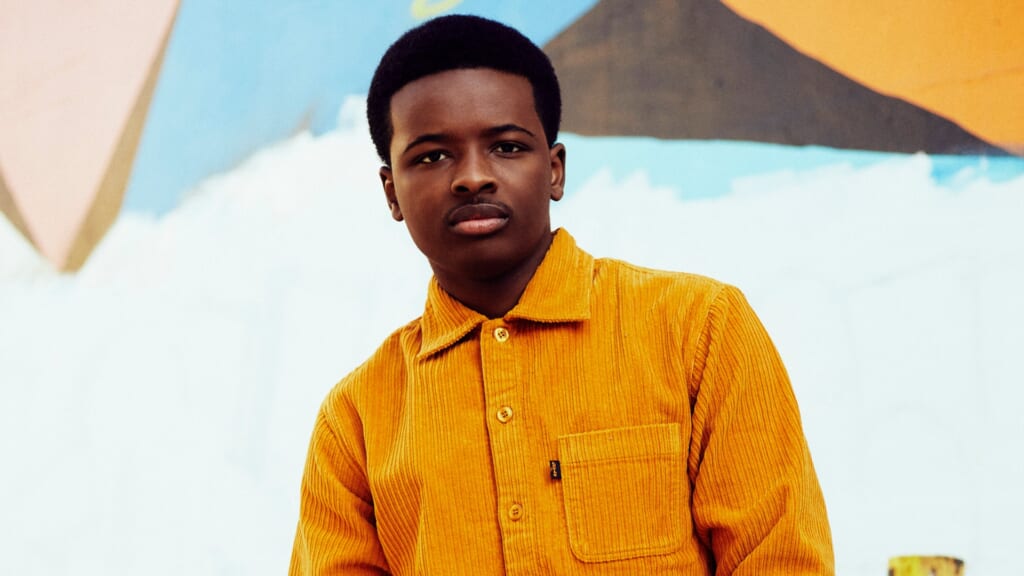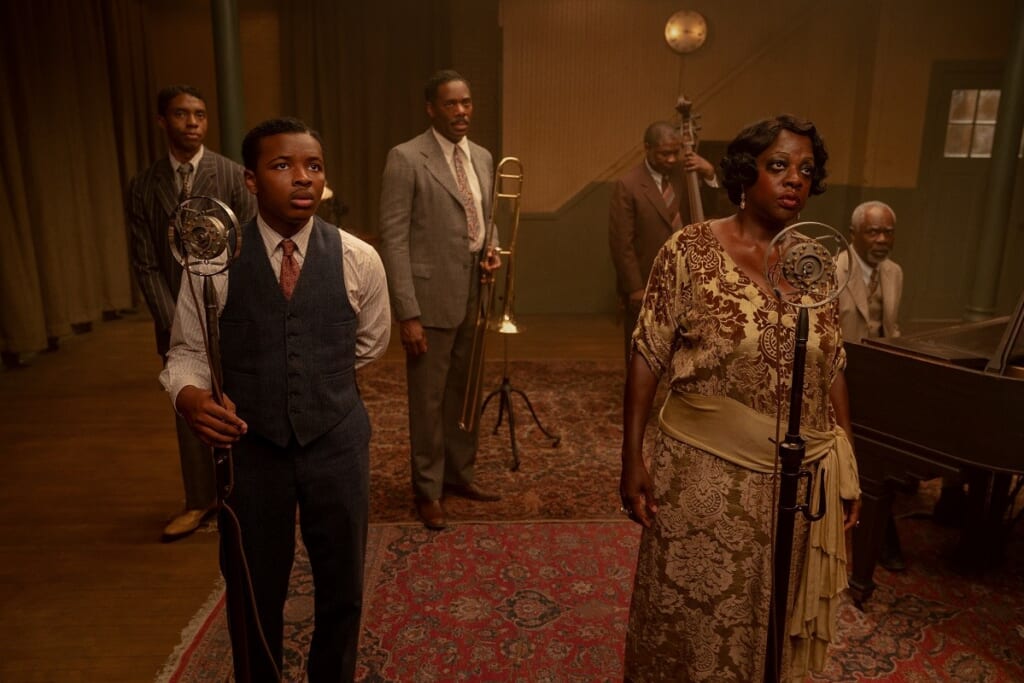Teen actor Dusan Brown dishes on ‘Ma Rainey’s Black Bottom’ and working with the late Chadwick Boseman
EXCLUSIVE: The young actor shares what he learned while working with some of the greats
In 2020, Generation Z has demonstrated that they can dominate political activism, new voter registration and activation and push for the change that generations before have been literally dying to see. Actor Dusan Brown is doing his part on the big and small screens to ensure diversity and representation in the entertainment industry. The Chicago native kick-started his career at the age of eleven and has since appeared on TV shows such as How I Met Your Mother, The Big Bang Theory, and Criminal Minds.
Read More: Meek Mill delivers toys, goods to 35 Philly families for Christmas
Brown also nabbed the role as young Ed Charles in 42, the Jackie Robinson biopic that catapulted its star, the late Chadwick Boseman, to fame. In a full-circle moment nearly seven years later, Boseman and Brown share the screen again in the Netflix film adaptation of August Wilson’s play Ma Rainey’s Black Bottom, starring Viola Davis as the Queen of the Blues. Brown plays Sylvester, Ma Rainey’s nephew, who is struggling with his transition from a boy to a man in the span of one crazy recording studio session in 1927 Chicago.

“The director – George C. Wolfe – this movie would be nothing without him and his vision. The guy just lives on another mental plane than anyone I’ve ever met,” Brown says. “[Ma Rainey] wouldn’t be anything without him. It was absolute joy working with all of [the cast]. There was not a day that went by without somebody saying something hilarious, laughing or having a good time.”
theGrio caught up with the teen actor about preparing for his role, what he learned from Boseman, and his career goals. Check out the conversation below.
theGrio: Tell us how you got your start in acting and what you love about it the most.
I got my start in entertainment through being born. When my brother was young, people would look at him and would say to my mom, ‘Oh man, he’s so cute. Is he an actor?’ One lady came up to my mom and told her, ‘Your son’s cute and we can get him into this industry.’ I was born into it, but I’m glad I was because I really love this industry. I love the idea of storytelling and the idea of becoming someone new or experiencing a world through a different lens. That’s what I really love about acting and storytelling in general. Even if you have past trauma or pain, films, TV, movies, and art can help heal those scars. It can be whatever you want it to be.
How did you prepare for your role as Sylvester and what did your creative process for getting into character look like?
When I got the audition, it came in an email. I read it over and thought it was just another audition. I looked [again] and saw part of it said ‘Denzel Washington,’ ‘Viola Davis,’ and ‘Chadwick Boseman,’ and I was like, ‘Oh man, this is crazy!’ I immediately read that my character had a stutter. I researched stuttering and I found this little Australian kid just talking. I watched it and I did my best to understand his frustration to communicate and the fact that he can’t communicate [in] words how frustrated he was getting.
I went into my audition, did what I could, and a few weeks later, with a fairly quick turnaround, I got the call saying that I got the part and my excitement was through the roof. I was so excited that after I got the call, there was this gap in my memory between [then] and when I was on set. It was an amazing experience with an amazing cast and crew. When I got to set, I talked to George about my character and we were just talking about this brick wall that you hit when you stutter. My character overcoming the stutter is breaking through that wall and becoming something better.
How does Sylvester play an important role in the climax of the storyline and the film overall?

I feel [Sylvester] added more tension than anything. If [the studio] is saying, ‘We’re running on a budget. We’re running low on time and we gotta get this [take] now,’ that’s putting stress on Ma and Ma’s putting stress on them. Levee’s putting stress on himself, which is putting stress on the band. I’m putting stress on everyone and putting stress on myself because I can’t get this thing right and by the time I get it right, they’re not even recording and that’s when everything boils over. I’m more of a stressor than anything.
How do you personally compare to, or contrast with, your character?
We compare in the sense that we both want to be better versions of ourselves. We both want to be the best person we can be and communicate in the best way possible. I feel like we don’t contrast in too many ways, if at all, because he’s a very outspoken kid even though he does have a stutter, as you can see when he stands up to Levee. He doesn’t let anybody walk over him, but it’s just the idea that he can’t get it out. Other than the fact that he has a speech impediment, I really related to this character mainly because he’s written as a young African American boy. August Wilson’s words, the way that he writes, it’s almost like you can connect with and understand any character to a tee because that’s just [his] artistry.
What was your experience like working with heavy-hitters on set such as Boseman, Viola Davis and Taylour Paige? What were some of the key things that they taught you?
The scene where I’m doing my speech and I’m standing up there trying to get the words right, we did it a fair amount of times. I started to get a little nervous. I started to get in my head a little bit and Chad pulled me aside and said, ‘We’re here for you. This is your time. Enjoy it and just be here. This time is for you and you’re here for a reason.’
That really stuck with me because in high school, I was going from one thing to the next, editing and writing films, keeping my grades up and applying for college – there was just so much going on. I never got a chance to just sit and understand the world around me. I never got a chance to basically be still and enjoy what’s in front of me. That’s something that [ Boseman] taught me – to enjoy what’s in front of me because you’re there for a reason.
You’re a director, a writer, an actor and a 2020 U.S. Presidential Scholar. What’s next in your career?
As of right now, I’m in talks for a lead role in a feature film, and hopefully, that goes well. On top of that, I finished writing my first feature that I’m gonna try to get funding for and hopefully make within the next year or so. I’m starting up my website to get crowdfunding.
How do you see Generation Z, specifically Black teens, taking over the entertainment industry?
Read More: ‘Insecure’ star Kendrick Sampson loses grandmother, 99, to COVID-19
I only have one hope and it’s gonna sound bleak but you gotta stay with me. My one hope is that we get a chance, and by that, I mean I hope we get a chance to tell the stories that we wanna tell without blockage or without people trying to twist our narratives or change our truths. That’s the one goal I have for my generation, as far as storytellers. And to have more of us, [so] more people see you don’t have to just be a rapper, but you can be a plethora of things. You can be whatever you wanna be. You’re not confined to one thing because of your geological location. You can do whatever you wanna do.
Have you subscribed to theGrio’s podcast “Dear Culture”? Download our newest episodes now!
TheGrio is now on Apple TV, Amazon Fire, and Roku. Download theGrio today!
